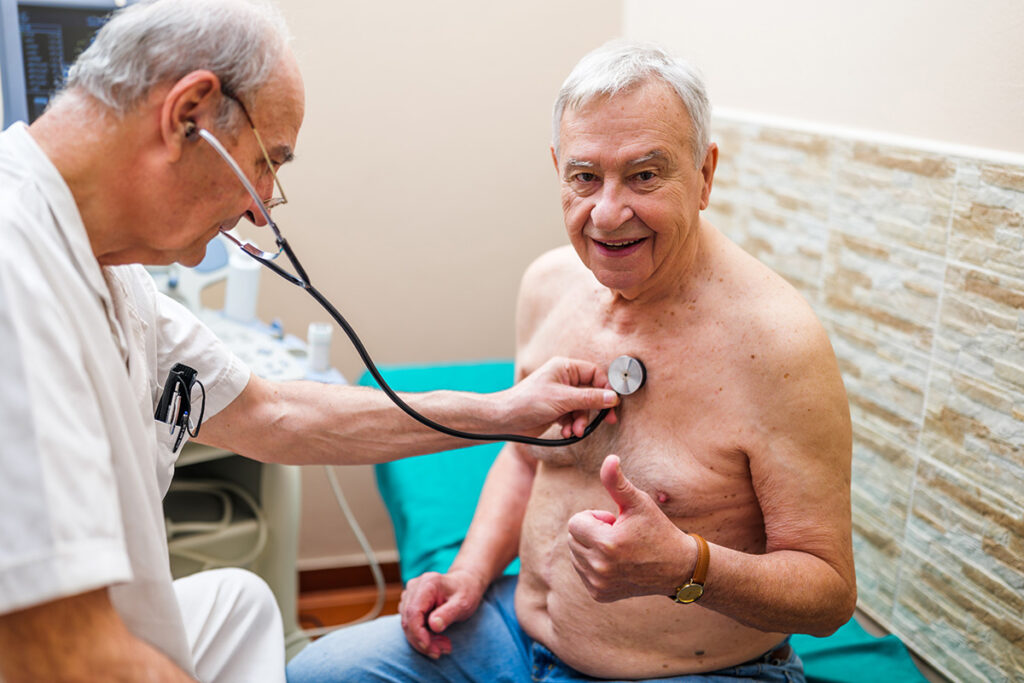By Dr. Alessandro Cristaudo, Internist at Aventino Medical Group, Rome
Autumn as an Opportunity for Prevention
With October comes a new phase of the year: shorter days, temperature changes, and a return to full work and sports activities. It is also a time when certain issues may emerge more frequently: fatigue, palpitations or extrasystoles linked to work stress, headaches, reduced concentration, or digestive disorders. These are often overlooked signals that deserve attention.
An autumn check-up does not mean undergoing unnecessary batteries of tests, but rather making a focused assessment of your health with an internist. Through consultation and physical examination, the doctor can evaluate the main risk parameters and, when necessary, prescribe targeted tests for further investigation.

What a Basic Check-up Includes
There is no rigid scheme, but some tests and evaluations are commonly recommended:
- Blood pressure → Regular monitoring helps detect hypertension, one of the main causes of stroke and heart attack.
- Blood tests (performed in external laboratories as needed): complete blood count, lipid profile (total cholesterol, HDL, LDL, triglycerides), fasting glucose, liver function (transaminases, gamma-GT), and kidney function (creatinine, estimated glomerular filtration rate).
- Internist examination → Assessment of the cardiovascular, respiratory, and digestive systems, weight check, and body mass index.
- Electrocardiogram (ECG) → Especially useful after age 40, in the presence of cardiovascular risk factors, or before engaging in sports; mandatory for all renewing a non-competitive sports medical certificate.
- Targeted ultrasounds → Abdominal or thyroid, when indicated, provide valuable information quickly and non-invasively.
The strength of a check-up lies not in the number of tests performed but in tailoring them to the patient’s medical history. An isolated lab result has little meaning without clinical context.

Why Early Diagnosis Makes a Difference
Many conditions begin silently. Hypertension, for example, can remain asymptomatic for years while progressively increasing the risk of stroke and heart attack. The same applies to elevated glucose, which can lead to type 2 diabetes, or high cholesterol, which accelerates atherosclerosis.
Identifying these conditions early allows intervention with simple yet effective strategies: improving diet, engaging in regular physical activity, reducing alcohol and tobacco use. In some cases, early pharmacological treatment can significantly reduce the risk of complications.
According to the World Health Organization, up to 80% of cardiovascular diseases and type 2 diabetes cases could be prevented through early diagnosis and lifestyle changes.

Autumn and Seasonal Vaccines
With the arrival of autumn, in addition to check-up tests, it is important to consider vaccinations: a simple step to reduce the risk of illness during the colder months.
- Flu vaccine
✔ recommended for everyone, every year, to avoid missing workdays
✔ especially important for people over 65, those with chronic conditions (diabetes, cancer, cardio-respiratory diseases), pregnant women, healthcare workers, and caregivers
✔ protects against complications (pneumonia, hospitalizations, flare-ups of chronic illnesses) - Pneumococcal vaccine
✔ recommended for the elderly and people with chronic conditions
✔ protects against serious infections that may require oxygen therapy or even ventilation - Herpes Zoster (Shingrix) vaccine
✔ recommended from age 50
✔ prevents shingles and chronic post-herpetic pain
✔ particularly useful for those with weakened immune systems - HPV vaccine
✔ recommended in adolescence, but also useful for adults at risk
✔ prevents infections that may evolve into cancers or precancerous lesions
✔ helps reduce virus circulation within the community
👉 Integrating an autumn check-up with preventive vaccinations means facing winter more protected and safeguarding the well-being of those around us.

FAQ – Frequently Asked Questions
Who should get an autumn check-up?
Anyone over 40, those with risk factors (overweight, smoking, family history of cardiovascular disease), or anyone wishing to focus on prevention.
Which tests are essential?
Blood pressure, basic blood tests, internist examination. Depending on clinical profile and risk factors, the doctor may prescribe other tests (ECG, ultrasounds…).
Do I need symptoms to schedule a check-up?
No. Its usefulness lies in early diagnosis, allowing action before symptoms appear.
Where can I get a check-up in Rome?
At Aventino Medical Group, with internists and over 20 other specialties available.
Conclusion: An Investment in the Future
An autumn check-up means facing the season with greater awareness. It is not just about detecting disease, but about enhancing prevention, improving lifestyle, and protecting long-term health.
👉 Book your check-up in Rome today at Aventino Medical Group or via Doctolib.
